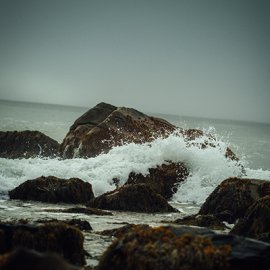RESCUE, part 2: Ocean Science Imperative
-
English
-
ListenPause
[intro music]
Welcome to World Ocean Radio…
I’m Peter Neill, Director of the World Ocean Observatory.
The ocean is a planetary source of mystery. It is inexplicable, a full spectrum of color and motion perceived on the surface, imperceivable below. The history of science is essentially natural history first, exploration and observation second, analysis and explanation third – all hampered by the inaccessibility of the object of study, fraught with danger, depth, and volumetric distribution. The first sailors were scientists, innovators in response to conditions – to build the boat, to find its way into a seemingly infinite unknown, to look and listen and document as oral tradition, crude maps and charts, books of sketches, drawings, and illustrations, opened by technology that enabled descent into the mystery, into the full ocean below, the water column, the geography, the discovered habitat, the multiple species in color, shape, and behavior like nothing known on land.
Technology has provided great advances: telling time at sea, navigation, collection, and the ability in hard helmet or scuba gear linked to an air supply to enable movement, depth, and safety, photography, video, research vessels, submersibles, satellites – each an exponential expansion of the capacity to explore the ocean world.
As we address the plight of the ocean today, science and technology are our best tools and brightest hope. The oft-quoted statement that “we know more about Mars than we do the ocean floor” is changing. National governments, private foundations, universities and research institutes have been engaged in a global effort to parse the ocean, to map a complete topography of the ocean floor, to understand the physics, chemistry, and biology of the marine environment that changes constantly, and differentiates uniquely across the 70% of the Earth’s surface that is oceanic.
We know now how independent actions on land have aggregated to compromise the natural state of the ocean through acidification, mineralization, pollution and toxins, emissions and plastic, hypoxia and dead-zones—all negative effects that have now become prolific, interconnected disciplines and studies of their own.
For every question answered, there is another question asked. At the conferences of experts, the scientists persistently ask for more funds, for more data, for more solutions and resolutions, and for more commitment to far more exploration, research, and conclusion, as if our ignorance of our ocean space, however informed, is without end.
Science, and technology are the best thing we do to know the ocean and thus to protect it. It is protean, as the baselines shift, but the collective energy, knowledge, and understanding has been astonishing over time.
Funds in the millions have been invested, and millions more are legitimately needed. The costs are cited as prohibitive, but without the investment we chose to be victims by our own hands. At the conferences, those pleas for resources to continue exploration will never be fully gratified. At the recent Climate Summit in Lisbon in 2022, it was clear that previous government financial commitments to the international climate agenda had not been met, and, while additional commitments were made at that meeting, it was not clear whether funding for projects to include the goals of the UN Decade for Ocean Science would be available, best intentions no longer credible currency in the discussions, only actions the measure of success.
After the meeting, 18 governments and private foundations banded together to sign on to the Bouknadel Statement, which indicated their intention to provide funds essential to keeping the science research initiatives alive. The participants were familiar, with substantial resources, although not enough to meet the substantial inventory of ocean- and climate-related science projects promoted by the UN organizers and researchers. It was a heartening, and disheartening outcome in that it was the same donors again, and the amounts surely will not be equal to the need.
If we are to have plan for the reparation and conservation of the ocean, it must rely on science and technology, and we must be grateful for the knowledge already assembled. The science must continue to evolve, be shaped and extended to meet the ever-changing, sadly deteriorating conditions of our ocean world. We must clarify the mystery, explain the inexplicable, and base our strategy on knowledge not speculation, on the pursuit of common health of all ocean-dependent creatures, ourselves as part.
Ocean science and enabling technology are imperative as the foundation for our ocean plan: RESCUE: R for renewal, E for environment, S for society, C for collaboration, U for understanding, and E for engagement.
We will discuss these issues, and more, in future editions of World Ocean Radio.
[outro music]
This week on World Ocean Radio, part two of a multi-part series entitled RESCUE, outlining a new plan for the ocean and a new perspective to enable a new set of actions for the future of the ocean. In this episode we argue that science and technology are our best tools and the imperative foundation for any future ocean plan.
About World Ocean Radio
5-minute weekly insights dive into ocean science, advocacy and education hosted by Peter Neill, lifelong ocean advocate and maritime expert. Episodes offer perspectives on global ocean issues and viable solutions, and celebrate exemplary projects. Available for syndicated use at no cost by college and community radio stations worldwide.
Image
Photo by Tim Foster on Unsplash
@timberfoster
- Login to post comments



